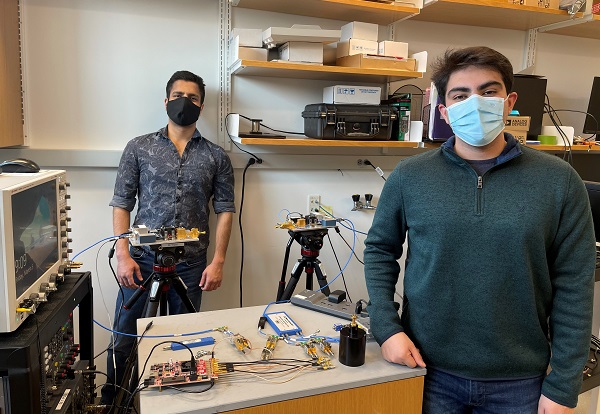Engaging Research from the Start

This article originally appeared in Engineering @ Northeastern magazine, Spring 2021.
Curiosity and engagement are top traits of high-potential talented students. To tap into and nurture this excitement, the College of Engineering introduced an innovative program in Fall 2020: Undergraduate Program for Leaders In Future Transformation (UPLIFT).
UPLIFT Scholars are paired with a faculty mentor and work in their mentor’s lab conducting research starting their first semester of their first year of study at Northeastern. By targeting research in the fall, a directed study (general elective) in the spring, a Research Experiences for Undergraduates in the summer, and additional experiences thereafter, scholars become competitively positioned for graduate work, national scholarships, and other accolades. Scholars also receive programming and community building opportunities through Northeastern’s Center for STEM Education.
With faculty mentor Professor Jeffrey Ruberti, Jordan Stewart, E’25, bioengineering, is engaged in research to create more efficient and cheaper COVID testing methods. “I’m doing a directed study this semester, and I only got that because of this program,” says Stewart who is testing whether certain kinds of microbes can be manipulated to signal a positive COVID test.
Stewart, who also participated in the Summer Bridge program and is a National Action Council for Minorities in Engineering (NACME) scholar, says “I think that the program will help me a lot with my co-op applications and give me a leg up.”
Daniel Devory, E’25, electrical and computer engineering, is researching how to speed up wireless communications systems as part of the program. Working under the guidance of Associate Professor Josep Jornet, Devory is helping to design an antenna that can propagate high-speed connections. Jornet is the director of the Ultra-broadband Nanonetworking (UN) Laboratory, which performs research on terahertz communication networks, wireless nano-bio-communication networks, and the Internet of Nano- Things.
“For wireless communications, all you want is really fast speeds and reliable connections,” says Devory. “Right now you’ll see 2.4 and 5 GHz. The lower GHz range is what most wireless electronics are using. But for faster speeds, you’re looking for a higher bandwidth. Since so many things are on this bandwidth in the low GHz, we had to find something that we could actually use to get to the higher speeds. That happens to be the terahertz band because nothing is really using it,” he explains.
Jornet and Arjun Singh, PhD’24, electrical engineering, taught Devory how to use the multi-physics simulation COMSOL and the Discover supercomputer to test potential antenna designs. “Even with the use of powerful hardware, different testing methods are needed to reach our research goals. Research is about discovering new things and attempting to overcome the obstacles that arise,” Devory says.
Devory’s research ultimately earned him a $500 PEAK Experiences Base Camp Award from Northeastern University’s Office of Undergraduate Research and Fellowships. Devory says that he and his team will use the money to have his antenna design manufactured.
“The UN Laboratory has one of the only test beds that can actually test terahertz frequencies. So once we get it made, we can actually test it,” he says.
Another Summer Bridge participant and talented UPLIFT scholar is Sofia Hadwen, E’25, environmental engineering. She is studying the effects of plastics on the environment with Associate Professor Aron Stubbins. More specifically, Stubbins’ research investigates how the sun degrades different types of plastics and what role microplastics play in microbial ocean life.
“I don’t think I would have gotten into research my first year, let alone my first semester, if it weren’t for the program,” Hadwen says.